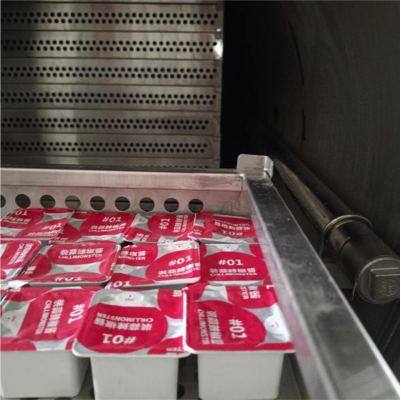How to identify defective products from food thermal sterilization
Date:
2022-06-13
Due to the high initial bacterial count in the food, incomplete sterilization, or extremely poor storage conditions, the microorganisms remaining in the container can proliferate and produce gas
1. Bacterial swelling of cans (bottles/bags)
Due to the high initial bacterial count in food, incomplete sterilization, or extremely poor storage conditions, residual microorganisms in the container proliferate and produce gas, causing the can to swell. These types of canned food are inedible, mostly toxic, and can cause illness and harm public health, even leading to death when consumed by humans.
There are also some bacteria that proliferate and do not produce a large amount of gas, keeping the container in a flat shape, such as flat sour bacteria, which cause the food to not swell but become sour. These types of food are also inedible.
Bacterial swelling of cans includes canned, bottled, and bagged foods, all of which are considered waste products.
2. Physical swelling of cans (bottles/bags)
Due to overfilling of contents, insufficient headspace in the can, causing the lid to bulge; inadequate vacuum during sealing; rapid pressure drop during sterilization and cooling leading to sudden changes in internal and external pressure; or thin tinplate causing internal pressure to exceed external pressure beyond a certain limit, resulting in poor lid contraction; or variations in temperature and altitude during the sales process (lower air pressure) can also cause physical swelling of cans.
Although this type of food has not deteriorated and does not affect health when consumed, it has lost its commercial value and should be classified as substandard products.
3. Chemical swelling of cans (bottles/bags)
Due to certain components in the contents of the can reacting with iron ions in the tinplate, causing electrochemical corrosion and producing gas (such as hydrogen or hydrogen sulfide), leading to swelling of the can. This generally occurs when the product is not sold in a timely manner after production, and the storage temperature in the warehouse is too high, accelerating the chemical reaction. This phenomenon occurs relatively more often in canned fruits, juices, and tomato sauces, which places higher demands on the tinplate and coatings.
These types of food generally accompany chemical substances, have unpleasant odors and tastes, and are not suitable for consumption, and should be classified as waste products.


Zhucheng lier Machinery Co., Ltd
Domestic excellent food, beverage, medicine and other fields of high temperature sterilization equipment, broken bag flotation drying line equipment suppliers and overall solution service providers.
Company Phone:
+86-182-6566-6762
National Service Hotline:
www.lretort.com
Company E-mail:
56313324@qq.com
Company Address:
Middle Section of High-tech Park Industrial Avenue, Mizhou Street, Zhucheng City

mobile phone station
Powered by 300.cn SEO Tags Privacy Policy

